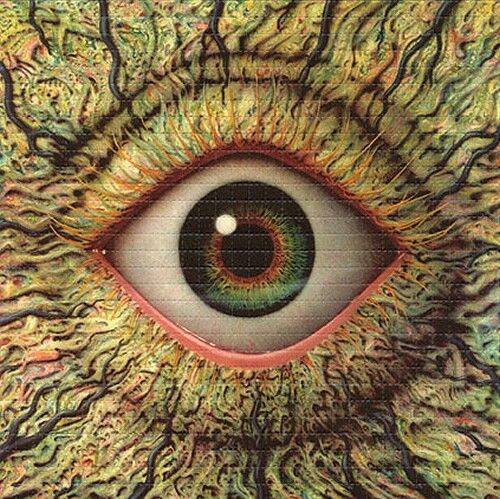Preparing for a First Acid Trip
Other useful resources: How to Change Your Mind, (annotated summary); Phases of an LSD Trip; Precise dosing of LSD; How to Find a Psychedelic Guide
I. Overview
o, you are thinking about taking LSD. LSD experiences are complex and long-lasting. For many people, some trips will involve emotional swings. LSD also has a pronounced "expectancy effect"; the experience one expects to have can significantly color the acid experience. As a result it is important to have a general understanding of what your LSD experience will be like, to be emotionally prepared for it and to create the atmosphere appropriate for the experience you are seeking.
You may want start by reading about the different phases of an LSD trip that are commonly encountered. Personal experiences vary, but this overview is an excellent starting point. Much of this article focuses on being prepared for tricky stuff. Please understand that people who are well-prepared for their acid trip almost always want to take LSD again. They seldom have unpleasant experiences and in the case that challenging emotions arise, this phase of the trip will almost always be a small part of a longer, joyous journey.
When you hear people who have had negative experiences ask yourself the following questions: Did they take a recreational dose (<150ug)? Did they apply the well-known techniques outlined below to guide their trip? Did they understand how to us Xanax (benzos) to impact their trip? Did they trip in a safe environment with good friends? We haven't encountered anyone who had a negative (won't repeat) experience who didn't fall short on one of these counts. So there is good reason to have confidence that your first experience with be a positive one.
II. Warnings
Warning: Do not take LSD if:
you have a personal or family history of psychotic disorders or other severe psychiatric disorder
you are taking Lithium, Tricyclics, Ritonavir or Indinavir, as there may be dangerous interactions.
Be aware: SSRIs (like Prozac, Paxil, Zoloft, Celexa, Desyrel) or MAOIs (like Nardil, Parnate, Marplan, Eldepryl, Aurorix, Manerix) are consistently reported to noticeably reduce the effects of LSD. MAOIs seem to cause a greater reduction in the effects of LSD than SSRIs. Larger doses may counteract the effects of SSRIs and MAOIs, but reduces the predictability of the experience.
III. Preparing
Reading a few trip reports may help set general expectations for what to expect. Reading about the phases of an LSD trip is also valuable.
Dose
Ask: what type of experience are you seeking? At low doses one will likely feel very much in mental control, while still enjoying visual effects such as beautiful colors and patterns, enhanced sense of taste and enjoyment of music. At a larger dose visual effects become more intense, including powerful hallucinations and significantly reduced ability to make sound decisions. Moving beyond this we leave the realm of recreational doses. Visuals and auditory hallucinations will be intense, but importantly one may lose almost all rational thought and enter a world of temporary psychosis, with the sense of self disappearing and magical thinking taking over the mind. This may be very enjoyable, interesting and/or disturbing and frightening.
For a first experience, a recreational dose is a great place to start. Some may want to start with a high dose, and go for a "spiritual dose" or a "heroic dose", but this guide is geared toward a recreational experience. Our only advice is to understand that there is a fun/recreational experience on one side of the LSD line, and a very different type of experience on the other side of the LSD line, and it's important to know which side of that line you want to be on.
A good recreational dose is 75ug to 125ug. For those with anxiety about LSD, one might aim for 75ug to 125ug. For those with no anxiety, a positive mental place and desiring a more intense experience, 125ug to 150ug may be better.
Note: Weight appears to play less of a role in dosing than is true with many other drugs. The doses above are based on a 150 lb person. From personal observations, a 50 lb increase or decrease in weight equates to no more than a 10% change in dose.
2. Getting Things Ready
You will want clean, uncluttered spaces for your trip, so tidy the rooms you plan to spend time in before the trip. Have a source of music ready for each room, or a portable speaker to bring with you. If you aren't tripping at home, clean up your bedroom so when you return home you have a pleasant environment to sleep/decompress in. Even if you aren't normally a clean freak, on LSD cleanliness/order almost always matters.
It's likely you want to spend much of your time outside, so consider whether there are safe places in your yard or a local park to enjoy nature. Have a picnic blanket ready and things you can use as pillows outside (rolled up beach towels work well).
Unlike most drugs, LSD is a great time to enjoy food (usually in the second half of the trip). Here is an article with some of our favorite things to eat and drink. Get everything ready in advance and then bring out small bites when you start to feel like eating. We usually start with sweet foods and then go savory. Quantity of food is generally very small early on.... one nut can go a long way.
3. Group Dynamics
When tripping with other people, it's valuable to have a discussion about preferred group dynamics. Do you intend to all stay together? Are there safe places for people to go to have personal time?
If there may be a sexual component to the experience, discuss boundaries before the trip, as it may be impossible to give meaningful consent or to establish healthy boundaries once the trip has started. Discussion may include comfort level around nudity, public displays of sexuality, physical touching of each other, etc.
Unlike MDMA, which tends to have a more consistent sexual component, LSD has a very mixed impact on sexuality. Some people may become more highly sexualized while for others it may decrease sexuality. Even once consent and boundaries are established before the trip, it's critical to continue to check in during the trip. Never expand a boundary beyond where it was during sobriety, but continue to check that what worked during sobriety still works throughout the trip.
IV. Guiding Your Trip
Mental State
Be aware of your mental state before the trip, both your mood the day of the trip and your overall mental state in your life. At recreational doses, most people find it fairly easy to control their mental state during a trip. If you have sadness or conflict in your life, these feelings may arise during the trip, but typically in a manageable or even cathartic manner.
There need never be “bad trips”. Trips may feel lighthearted, they may feel heavy. They may feel easy, or they may feel complicated. Always approach a psychedelic experience with the assumption that the experience will be a positive one for you. Spend some time visualizing the general type of experience you want to have - it will likely become a self-fulfilling prophecy. If you want to have a fun, recreational experience, just focus on having that type of experience, and set the stage accordingly with a nice sunny day, upbeat music and lively friends. But also be prepared to embrace a more complicated experience, without viewing it as bad. Learn from every experience and use it for personal growth and mental cleansing.
Note: in our experience, even if you are not in a happy place in your life, LSD can be a rewarding experience. Dealing with powerful loss, such as the death of a loved one or the end of a significant relationship need not, by itself, preclude an amazing experience. Psychedelics have been clinically shown to be effective at helping people cope with their own terminal illness. However, there is a significant chance that these experiences will impact your LSD trip, and you may feel deep sorrow, a profound sense of poignancy, or other powerful emotions. Therefore, you should be in a mindset to allow those emotions to arise, live with them for as long as feels healthy and cathartic, and then actively cause them to move on as described below. You should be mentally prepared to accept these emotions without strong fear or anxiety, and simply accept these as being a natural part of any LSD experience, and a natural part of life itself.
2. Challenging Trips
For well-prepared people, who take an appropriate dose, in a carefully curated setting, challenging trips are very rare. Despite the best preparation, some trips may be more challenging than others. The best way to avoid a challenging experience is to understand: 1) there is an exceptionally low risk of long-term negative physical or psychological problems associated with LSD (zero reported in thousands of clinical studies); and 2) most people find that they are able to guide their experience to where they want it if they have the right tools.
Unlike many drugs, on LSD most people can choose to change their mental state if they find themselves to be in a challenging emotional place. The first thing to do if you experience something emotionally challenging that you want to stop is to change things up: go someplace with a lot of light (preferably sunlight), put on new music, talk with a new person about a new topic of conversation.
If you are sharing the experience with someone having a challenging experience, first ask them if they would like to have a different experience (never assume that someone wants a change…a sobbing person may be experiencing a deep psychological breakthrough they will treasure forever more). If they want to change their trip, encourage them to seek more light, different music and engage them gently in conversation. Remain calm and patient. Results may take a bit of time. Avoid asking them to describe the challenges they are feeling, as this will focus their mental energy on the challenge. Instead distract. If your efforts don’t pay off, ask them to spend a few minutes helping you with something. Focusing on someone else is one of the most effective means to change one’s emotional state.
If you are struggling, do not be embarrassed to ask for help. If someone else appears to be struggling, ask in a neutral way if they need anything. Someone sobbing during an LSD experience may be an indication of something not going right... or it may be a moment of grand self-awareness, which they will treasure forever. Never make an assumption about others' states of mind.
You may also want to have Xanax or a similar benzo class drug on hand. Taking one will greatly reduce the psychedelic effect of LSD, as well as general anxiety. It is likely you can take one and take a nap to end your LSD experience. While it's worth having Xanax at hand, we have never been with anyone who has decided to use it. Changing music, conversation and/or location has always been entirely effective in helping people have the acid experience they desired. However, those who are anxiety prone may feel less anxiety simply knowing that the option to end the trip is available, eliminating the need to ever take the Xanax.
3. Interacting with others
Never assume you know what another person is experiencing on LSD. It is common for LSD to cause people to believe to have deep insights into another person's mind state, and these insights can be extremely inaccurate. Therefore, always ask direct questions before making assumptions about what any other person wants or desires on LSD
Consent. Sexual consent on LSD is tricky at best. At higher doses, even understanding the concept of a sexual experience may be impossible (during ego dissolution, sex may be conceptualized in bizarre ways, for example). Therefore, if sex may be on the table, expressly discuss sexuality prior to ingesting LSD and establish boundaries prior to a trip. LSD is a very poor time to start a sexual relationship or extend boundaries with a new partner. We believe most people are not in a position to give meaningful consent during an LSD experience and the risk of causing or experiencing substantial harm as the result of an unwanted sexual encounter is significant.
4. Partnership dynamics
A common area of conflict during a trip are romantic partners wanting different lengths or intensity of experiences. It's very important to either get on the same page by going with the more conservative experience (e.g., lower dose, not re-dosing), or to get on the same page by agreeing to have different experiences. Avoid getting on the same page by pushing anyone out of their comfort zone. Remember, this is only your first experience and it is more important to have a positive connecting experience your first time out than to have an intense and entirely fulfilling experience.
It is very common for people to have complex emotions around their interpersonal relationships during an LSD experience. While LSD may lead to significant insights, it usually takes many days after a trip to process the experience. An acid trip is not a great time to have a challenging conversation. It's also not a great time to make an unexpected marriage proposal. Focus on what connects you to your partner. If you start your trip believing it will be a connecting experience, and throughout the trip look for connecting moments, you will likely walk out of the experience more in love than ever.
Remember to give your partner space if they request it (physical or emotional) or support if requested. LSD experiences can vary radically between people. Avoid the temptation to try to change your partner's emotional state unless they request the change (or respond affirmatively if you ask them if they would like help to change their head space).
V. After Care
Most people can go to work the next day without issue, and do all the day-to-day things they normally do. Some people report feeling mental fatigue, but otherwise there is very little or no hangover the following day, assuming you get a good night's rest. You may be very hungry if you haven't had a good meal after the trip, so plan accordingly. Not only do we find little or no hangover the next day, LSD is a wonderful hangover cure for MDMA - taking MDMA on a Friday or Saturday night and LSD the next day all but eliminates the MDMA hangover for us, so much so that we seldom do MDMA without following up with LSD the next day.
But be gentle with yourself and other trippers in the days after an LSD experience.
Take the time to reflect on your experience, including any personal insights you may have discovered. The role of your ego may feel significantly diminished in the days following a trip. You may have a feeling of acceptance of yourself and others. And you may have deep insights.
You may also have false insights, misinterpretation of your experience, and confusion. It is critical: Do not make big life decisions in the days following a trip. People often chuckle when they hear this advice the first time (and it's very common advice).
Guess what? People quit jobs after an LSD experience. They break off long term relationships. They delete Facebook accounts. They do all sorts of drastic things. And then they may feel deep regret over the hasty decision. Take the time to process your experience. You may decide to make a life change... but give it a week. If it's critical to do, it will still feel just as critical a week later.
Talk to others about the experience and how to best integrate any insights into your life. And then set a date six months out to do it again. Happy tripping!





